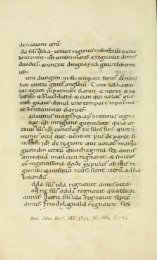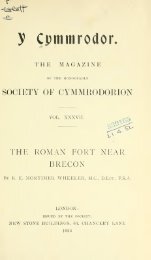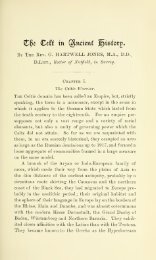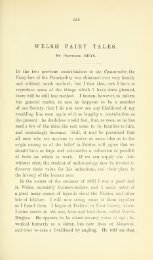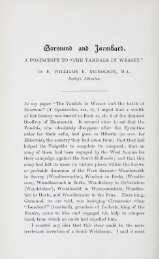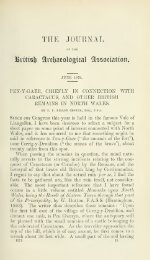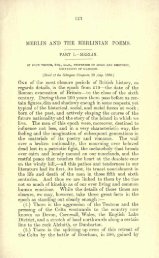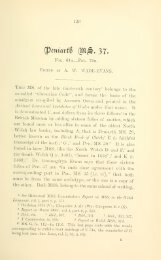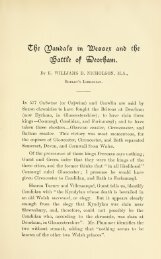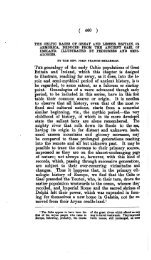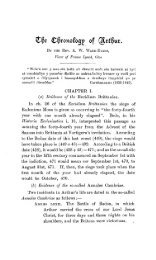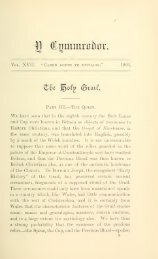- Page 1 and 2: PUBLICATIONS OF THE UNIVERSITY OF M
- Page 3 and 4: AN INTRODUCTION TO EARLY WELSH BY T
- Page 5 and 6: PREFACE THIS book is the outcome of
- Page 7 and 8: PREFACE vii from Berlin whither he
- Page 9 and 10: PREFACE ix of the functions of ry,
- Page 11: CONTENTS xiii IV. The Procedure in
- Page 14 and 15: xvi LIST OF ABBREVIATIONS Lat. Laws
- Page 16 and 17: 2 SOUNDS AND SOUND-CHANGES. [ 2. A.
- Page 18 and 19: SOUNDS AND SOUND-CHANGES. [3. (e) T
- Page 20 and 21: 6 SOUNDS AND SOUND-CHANGES. [ 7. mo
- Page 22 and 23: 8 SOUNDS AND SOUND-CHANGES. [ii. (b
- Page 24 and 25: 10 CONSONANT MUTATIONS. [. particul
- Page 26 and 27: 12 CONSONANT MUTATIONS. [ 16. (ft)
- Page 28 and 29: 14 CONSONANT MUTATIONS [ 16. II. 32
- Page 30 and 31: i6/ CONSONANT MUTATIONS. [ 16. sepa
- Page 32 and 33: i8 CONSONANT MUTATIONS. [ 18. C. LE
- Page 34 and 35: 20 CONSONANT MUTATIONS. [22. (d) Af
- Page 36 and 37: 22 THE NOUN. [25. THE NOUN. NUMBERS
- Page 38 and 39: 24 THE NOUN. [27. tige). Under the
- Page 42 and 43: 28 THE ADJECTIVE. 36. ADJECTIVE PHR
- Page 44 and 45: 30 THE NUMERALS. [40. yn drwmm (trw
- Page 46 and 47: 32 THE NUMERALS. [42. exceptions, e
- Page 48 and 49: 34 THE PRONOUN. L 4 6. well noc wy
- Page 50 and 51: 36 THE PRONOUN. [49. recognise it B
- Page 52 and 53: THE PRONOUN. (c) In the i sg. and 3
- Page 54 and 55: 4 o THE PRONOUN. [53- trwy through
- Page 56 and 57: 42 THE PRONOUN. [58. Remarks. 58. (
- Page 58 and 59: 44 THE PRONOUN. [62. (c) Preceded b
- Page 60 and 61: 46 THE PRONOUN. [68. gymeint arall
- Page 62 and 63: 48 THE PRONOUN. [79. RB. 258; dywet
- Page 64 and 65: 50 THE PRONOUN. [83. (8) Before the
- Page 66 and 67: 52 THE PRONOUN. [87. Duw a wneynt o
- Page 68 and 69: 54 THE VERB. [91. THE VERB. PREVERB
- Page 70 and 71: 56 THE VERB. [93- (d) When the pred
- Page 72 and 73: 58 THE VERB. [96. maiden RB. 113 ;
- Page 74 and 75: 60 THE VERB. [97. (c) With the pres
- Page 76 and 77: 62 THE VERB. [ 101. naw brenhin cor
- Page 78 and 79: 64 THE VERB. [ 106. PRESENT. 106. (
- Page 80 and 81: 66 THE VERB. [ 107. yna rwng deu dy
- Page 82 and 83: 68 THE VERB. [ 109. wy, ef a wnaeth
- Page 84 and 85: 70 THE VERB. [ 112. THE USAGES OF T
- Page 86 and 87: ?2 THE VERB. [ 114. RB. II. 114; a
- Page 88 and 89: 74 THE VERB. [ 114. (h) Relative cl
- Page 90 and 91:
dynessa-af, 76 THE VERB. [ 118. The
- Page 92 and 93:
78 THE VERB. [ 120. going) you shal
- Page 94 and 95:
8o THE VERB. [ 126. till to-day I h
- Page 96 and 97:
82 THE VERB. 1 5 SUBJUNCTIVE. PRESE
- Page 98 and 99:
84 THE VERB. [ 129. traethattor wil
- Page 100 and 101:
86 THE VERB. [133. mynet go \ aeth
- Page 102 and 103:
88 THE VERB. [ 137. Imperative. 137
- Page 104 and 105:
IRREGULAR VERBS. [ sing. 1. el(h)wn
- Page 106 and 107:
IRREGULAR VERBS. [ sing. 1. gwnaf 2
- Page 108 and 109:
94 IRREGULAR VERBS. [ 143. ITERATIV
- Page 110 and 111:
96 IRREGULAR VERBS. [ 144. sing. IM
- Page 112 and 113:
98 THE SUBSTANTIVE VERB. [ 152. THE
- Page 114 and 115:
ioo THE SUBSTANTIVE VERB. [ 153. 15
- Page 116 and 117:
102 THE SUBSTANTIVE VERB. [ 154. gw
- Page 118 and 119:
104 THE COPULA. [ 156. keeper every
- Page 120 and 121:
106 COMPOUNDS OF EOT. [ 160. COMPOU
- Page 122 and 123:
io8 COMPOUNDS OF EOT. [ 161. freque
- Page 124 and 125:
i io THE PREPOSITION. [165. ( = att
- Page 126 and 127:
ii2 THE PREPOSITION. [172. went out
- Page 128 and 129:
ii 4 THE PREPOSITION. [183. coming
- Page 130 and 131:
ii6 THE PREPOSITION. [190. mountain
- Page 132 and 133:
ii8 THE PREPOSITION. [196. Redynvre
- Page 134 and 135:
120 THE CONJUNCTION. [199. tongues,
- Page 136 and 137:
122 THE CONJUNCTION. [208. 208. eis
- Page 138 and 139:
i2 4 THE CONJUNCTION. [216. mal y g
- Page 140 and 141:
126 THE CONJUNCTION. [222. hono nor
- Page 142 and 143:
128 THE CONJUNCTION. [226. yno hoff
- Page 144 and 145:
i 3o THE CONJUNCTION. [230. tyuawd
- Page 146 and 147:
132 NEGATIVE PARTICLES. [236. ac na
- Page 148 and 149:
i 3 4 RESPONSIVE PARTICLES. [239. m
- Page 150 and 151:
136 THE INTERJECTION. [243-244. oi
- Page 153 and 154:
I. LEAR AND HIS DAUGHTERS." FROM TH
- Page 155 and 156:
LEAR AND HIS DAUGHTERS 141 ohanei 1
- Page 157 and 158:
LEAR AND HIS DAUGHTERS 143 di, ath
- Page 159 and 160:
II. THE STORY OF ARTHUR. FROM THE R
- Page 161 and 162:
THE STORY OF ARTHUR 147 eu herbyn,
- Page 163 and 164:
THE STORY OF ARTHUR 149 A phan wela
- Page 165 and 166:
THE STORY OF ARTHUR 151 Ac odyna g6
- Page 167 and 168:
THE STORY OF ARTHUR 153 LumonGy, a
- Page 169 and 170:
THE STORY OF ARTHUR 155 vuched. Ac
- Page 171 and 172:
THE STORY OF ARTHUR 157 Sef achaCs
- Page 173 and 174:
THE STORY OF ARTHUR 159 ysparduneu
- Page 175 and 176:
THE STORY OF ARTHUR 161 a thei eure
- Page 177 and 178:
THE STORY OF ARTHUR 163 brenhin yr
- Page 179 and 180:
THE STORY OF ARTHUR 165 pOyt or a o
- Page 181 and 182:
THE STORY OF ARTHUR 167 clot eu mil
- Page 183 and 184:
THE STORY OF ARTHUR 169 o neb ohona
- Page 185 and 186:
THE STORY OF ARTHUR 171 aflu ae def
- Page 187 and 188:
THE STORY OF ARTHUR 173 eglurder y
- Page 189 and 190:
THE STORY OF ARTHUR 175 a oruc GCal
- Page 191 and 192:
THE STORY OF ARTHUR 177 diwed gOedy
- Page 193 and 194:
THE STORY OF ARTHUR 179 47. A gOedy
- Page 195 and 196:
THE STORY OF ARTHUR 181 gOyr hynn.
- Page 197 and 198:
THE STORY OF ARTHUR 183 senedOr. Ac
- Page 199 and 200:
THE STORY OF ARTHUR 185 yd. oedynt
- Page 201 and 202:
THE STORY OF ARTHUR 187 a Pholites
- Page 203 and 204:
THE STORY OF ARTHUR 189 hOnnO yn go
- Page 205 and 206:
THE STORY OF ARTHUR 191 a achaOs di
- Page 207 and 208:
193 III. THE HUNTING OF TWRCH TRWYT
- Page 209 and 210:
THE HUNTING OF TWRCH TRWYTH 195 5.
- Page 211 and 212:
THE HUNTING OF TWRCH TRWYTH 197 oed
- Page 213 and 214:
THE HUNTING OF TWRCH TRWYTH 199 Dyu
- Page 215 and 216:
THE HUNTING OF TWRCH TRWYTH 201 A d
- Page 217 and 218:
THE HUNTING OF TWRCH TRWYTH 203 rod
- Page 219 and 220:
THE HUNTING OF TWRCH TRWYTH 205 Gly
- Page 221 and 222:
THE HUNTING OF TWRCH TRWYTH 207 gOe
- Page 223 and 224:
A SUIT FOR LANDED PROPERTY 209 eli
- Page 225 and 226:
A SUIT FOR LANDED PROPERTY 21 Odena
- Page 227 and 228:
A SUIT FOR LANDED PROPERTY 213 agke
- Page 229 and 230:
A SUIT FOR LANDED PROPERTY 215 er y
- Page 231 and 232:
A SUIT FOR LANDED PROPERTY 217 kuss
- Page 233 and 234:
A SUIT FOR LANDED PROPERTY 219 kann
- Page 235 and 236:
A SUIT FOR LANDED PROPERTY 221 vnth
- Page 237 and 238:
di THE PRIVILEGE OF ST. TEILIO 223
- Page 239 and 240:
22 5 VI. MORAL VERSES. Kalan gaeaf,
- Page 241 and 242:
227 VII. DOOMSDAY. Deus Du6 delwat,
- Page 243 and 244:
A dayar gychwyn. Ac uch pop mehyn A
- Page 245 and 246:
A wanpCyt vyn tu. Teu yG chitheu Ma
- Page 247 and 248:
233 VIII. TO GWENWYNWYN. Ysym arglG
- Page 249 and 250:
CYNDDELW TO RHYS AB GRUFFUDD 235 Me
- Page 251 and 252:
237 X. A RELIGIOUS POEM. BLACK BOOK
- Page 253 and 254:
239 XI. A DIALOGUE BETWEEN UGNACH U
- Page 255 and 256:
241 XII. WINTER. Llym awel, Hum bri
- Page 257:
Glossary
- Page 260 and 261:
246 GLOSSARY. aer-glwyf dealing wou
- Page 262 and 263:
248 GLOSSARY. awel m. a breeze, win
- Page 264 and 265:
250 GLOSSARY. Weir Warwick, C. Wynt
- Page 266 and 267:
252 GLOSSARY. corn a horn, trumpet
- Page 268 and 269:
254 GLOSSARY. cyn-digrifed as pleas
- Page 270 and 271:
256 GLOSSARY. di-afael exempt from
- Page 272 and 273:
258 GLOSSARY. dygyn hard, severe ;
- Page 274 and 275:
260 GLOSSARY. esgyrn, see asgwrn. g
- Page 276 and 277:
262 GLOSSARY. *gor-ysgelu to overfl
- Page 278 and 279:
264 GLOSSARY. gwreigawl womanish, c
- Page 280 and 281:
266 GLOSSARY. hynt f. a course, pat
- Page 282 and 283:
268 GLOSSARY. mach m. a surety, gua
- Page 284 and 285:
270 GLOSSARY. newidyaw to exchange
- Page 286 and 287:
272 GLOSSARY. Presseleu n.l. 204, 6
- Page 288 and 289:
274 GLOSSARY. fiery. seilaw to foun
- Page 290:
2 7 6 GLOSSARY. trwssyad (trwssad)



